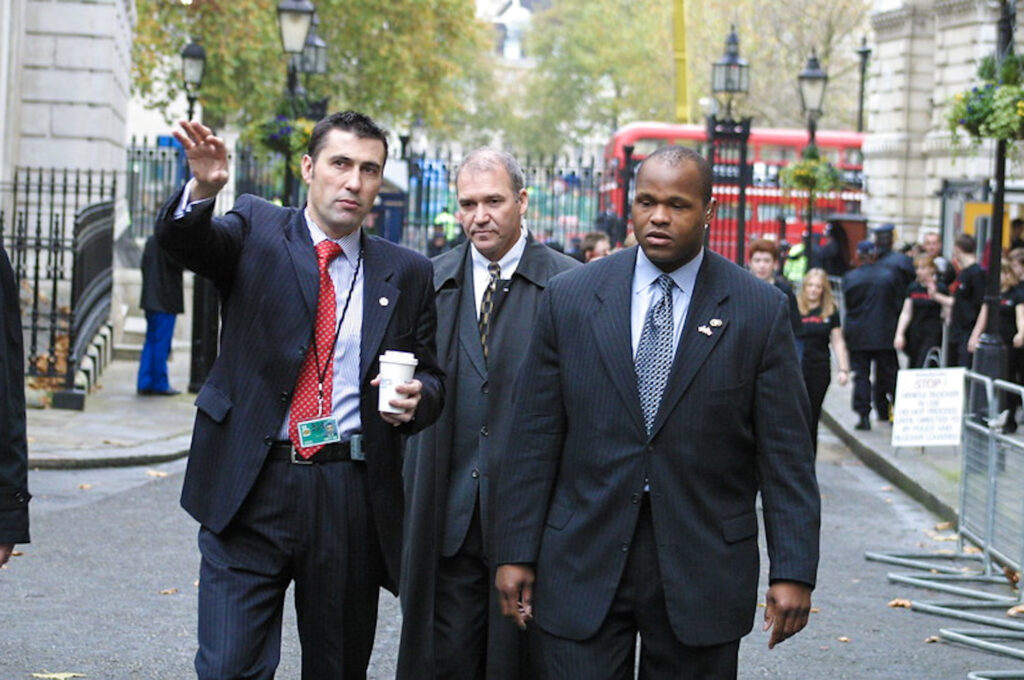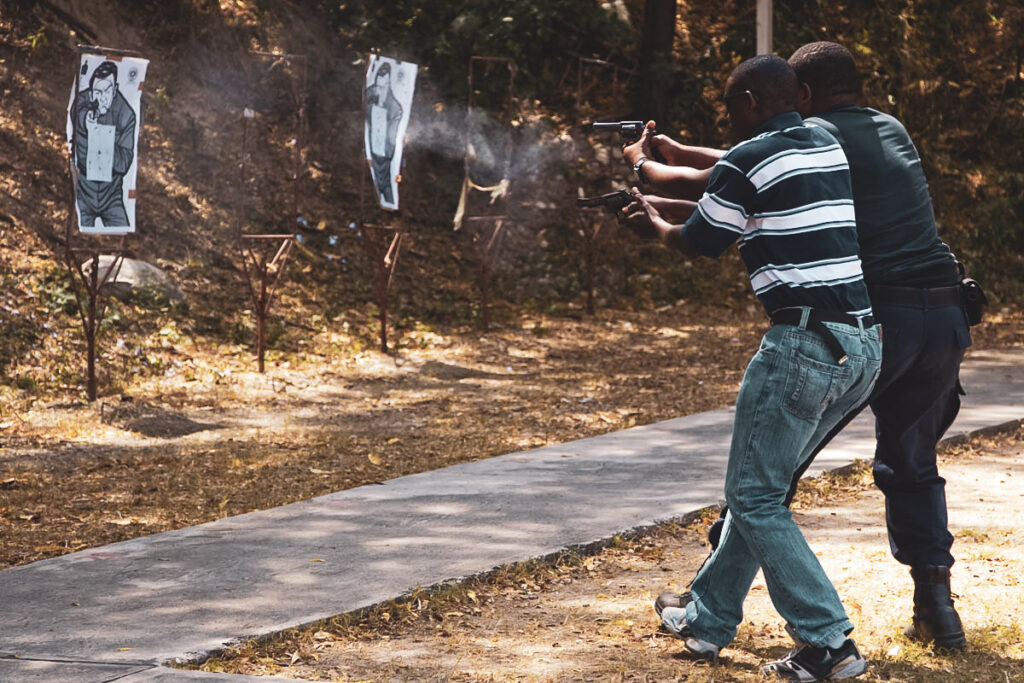Getting started with a career in close protection and intelligence services requires a certain level of education and training. In fact, there are plenty of courses and programs on executive protection certification available. Still, building a career in EP takes years of specialized training, experience, and dedication.
Sadly, the possibility of someone inviting you to a job opportunity straight out of a close protection course is pretty slim. Landing one of these jobs takes time and skill while learning to protect clients and their assets. Moreover, for recent grads to prepare themselves for the life of an Ep specialist demands education and training, vetted by life experience.
Note: A standardized and approved executive protection certification to become an authorized EP specialist doesn’t exist. Granted, this is the situation now, but it may change soon.
Nevertheless, many private schools offer complete courses for students to gain extensive training and development. In no time, they can become skilled in firearms and combat training, and advanced driving tactics. Sounds too good to be true?
At any rate, everyone would benefit if schools and training providers reveal the kind of certifications they offer. That way, people could avoid some of the predatory marketing practices schools use, leaving students broke, ignorant, and empty-handed. Besides that, when the time comes to hand over the credentials, there are none.
Once upon a time, in the field of Executive Protection, you needed to have decent credentials, including a solid foundation of training from a well-known and reputable EP school. Executive Protection Institute (Richard Kobetz) and Executive Security International (Bob Duggan) were the two foremost EP schools for ages.
Of course, if you came from the field of law enforcement or the military, you were able to move into the field fairly easily, depending on the mission. However, post 9/11, the EP field exploded and standards were no longer a consideration – it was a matter of getting enough “bodies” to fill a detail.
Thankfully, James Cameron has established the Board of Executive Protection Professionals which will bring standards and consistency back to the industry. It will take time and, as the saying goes, all good things are worth fighting for and worth the wait.
– Dr. Mary Beth Wilkas Janke, Hunter Global Security Strategies
Why Accreditation Matters
The Board of Executive Protection Professionals has commenced the process of creating a consistent and measurable platform of minimum standards which industry providers will refer to. Firstly, such standardized measures need to be approved by the American National Standard Institute. Fortunately, the advent of set standards will help advance the industry.
Depending on the country in question, basic standards may vary. On top of this, training schools and course providers follow the latest standards and measures established by their country’s governing body.
For instance, the security industry in the UK and Australia apply education standards professionally. Likewise, the Vocational Education and Training Accreditation Board and the Police Security Registry rate the training and qualification of Australian CPOs. Similarly, operatives in the UK receive licensing by the Security Industry Authority (SIA).
By comparison, nations like South Africa don’t have an accepted standard for executive protection certification and training. The main issue here lies in the lack of consensus on what the relevant essential standards are and the competencies that agents require.
Paths to Executive Protection Certification
The world’s largest membership organization gathering security management professionals, ASIS International receives accreditation from the ANSI. They act as a liaison on two technical committees of the International Organization for Standardization (ISO). ASIS has formed relationships with recognized leaders in security. They have a long directory of preferred close protection education providers for recognized certifications. These qualifications include:
- Certified Protection Professional,
- Professional Certified Investigator,
- Associate Protection Professional, and
- Physical Security Professional.
Earning an ASIS board certification is a visible validation of security education achievement. Anyone planning a career in EP should consider applying for certification with ASIS. If nothing else, earning a qualification with a security education leader helps elevate your stature against competitors.
Furthermore, The Henley-Putnam School of Strategic Security is an accredited college institution offering 150 courses, bachelor’s and master’s degrees, and 31 certificate programs. Students major in personal protection management, terrorism, and counterterrorism, or intelligence management. For the time being, The Henley-Putnam School operates through distance learning only.
Still, there are many other universities that offer academic programs specializing in strategic security studies. The College of International Security Affairs, part of the National Defense University in Washington, awards the Regional Defense Fellowship and the Joint Special Operations Master of Arts program, just to name a few. These programs aim to build students’ skills set to become effective strategic advisors.
Then you have recognized EP training school providers such as The Executive Security International Ltd. ESL provides an intensive EP residency program and an ESI certificate training course. The Colorado Department of Higher Education approves and regulates the validity of ESI courses.
Likewise, ESS Global Corporation, an EP training institution from Florida, is licensed by the US Department of Education. Above all, ESS offers comprehensive security training programs.
Choosing The Right Candidate
Given the many options to EP certification, it helps to thoroughly research what these schools or programs provide. Whether they can help you reach your goals and some rather intangible things like networking opportunities that can lead to good jobs.
Even so, the reputation of the school you select may follow you into that job interview or hang over a pitch to a corporate security job. Unfortunately, this is the reality in any industry, so choose wisely.
In fact, here are several important factors to consider when selecting an executive protection school:
- Location,
- Price,
- Coursework, and
- Reputation.
Location: Some reputable EP schools offer online courses. Fortunate for anyone who needs to travel to other states to receive preparation. But online schools aren’t equal to education providers with onsite training facilities. Here, students undertake practical exercises and get hands-on experience on how to use such tactics.
Price: The promise of a new career for USD 1.500 and only 30 hours of coursework is nothing more than a marketing tactic. Furthermore, steer clear of institutions that promise you the title of a “certified executive protection specialist” upon completing their course.
Coursework: Some topics that a useful curriculum should cover include security knowledge, protective skills and unarmed combat, tactics in evasive maneuvering, and the ability to provide emergency medical care.
Reputation: Word of mouth is important and online reviews may help you to determine the best programs and schools. A school or program provider with positive comments that outnumber any negative ones must be doing something right.
Most often, EP training schools have a strict and formal enrollment process and conduct interviews to get an in-depth view of prospective students’ goals, ambitions, background, etc.
Quick tip: Anyone in the United States should consider contacting the Better Business Bureau to investigate schools of interest.
Non-School Routes to an EP Career
Finally, securing a job in the close protection industry is possible through an impressive resume. The route one takes to a close protection career isn’t exclusive to obtaining an EP certificate from a reputable school.
While almost every EP school will teach a combination of hard skills, it’s in real-life experiences that you meet the necessary soft skills. In reality, the most applicable abilities for an agent don’t come from a certificate, time on the range, or hours spent on defense training.
In truth, a completed certificate program will rarely give you the tools you need to get ahead in this industry. Specifically, empathy, emotional awareness, etiquette, cultural awareness, good manners, and great communication skills are built through experience.
Besides, individuals transitioning from law enforcement or the military already know the rudiments of team operations and communications. With years of practical experience behind them, they must also meet the minimum standards, including:
- A high school diploma or GED,
- 18 years of age or older,
- CPR, First Aid, or AED training, and
- Valid driver’s license.
Note: A license/permit to carry a concealed firearm or a USA HR218 may be required. Armed protection is not a primary request. Not all EPAs need to carry firearms on the job or have the authority to. Depending on the state or country, an organizational firearms license may be mandatory for corporate security.
To Sum Up
It’s possible for anyone interested to have a successful career in the EP industry. Even so, it takes dedication to go the distance, with years of training, education, and experience succeeding in as dangerous a job as close personal protection.
The EP industry is growing and fast. Naturally, in the coming years, more people than ever will join the ranks of professional operatives. As a result, this industry needs to think about how we train future practitioners.
Of course, we need to attract and keep talented individuals with diverse life stories and experiences in the field. Not to mention, it’s important to help nurture this talent through executive protection certification and training programs that meet consistent and measurable minimum standards.
Having a coherent and measurable platform is the very least when trying to advance the industry.







